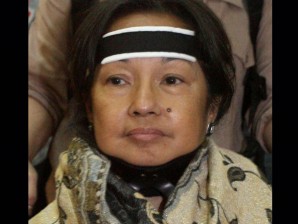New case filed vs Arroyo for Owwa fund transfer
The Department of Justice (DOJ) has recommended the indictment of former President Gloria Macapagal-Arroyo and three former officials in her administration for two counts of technical malversation in connection with the alleged misuse and illegal transfer of P546 million in Overseas Workers Welfare Administration (Owwa) funds in 2003.
The DOJ preliminary investigation panel also recommended the filing of charges against former Foreign Secretary Alberto Romulo, former Owwa Administrator Virgilio Angelo and former PhilHealth president and chief executive officer Francisco Duque III, currently chairman of the Civil Service Commission (CSC).
Labor Secretary Rosalinda Baldoz, former Labor Secretary Patricia Sto. Tomas, former Labor Undersecretary Manuel Imson and Owwa trustees Mina Figueroa, Caroline Rogge, Victorino Balais, Gregorio Oca and Virginia Pasalo were cleared by the panel due to absence of probable cause.
The Owwa trustees were absolved of the charges because, according to the panel, they were only following Arroyo’s order.
The case will be referred to the Office of the Ombudsman for its approval and action. The DOJ panel, headed by Senior Assistant State Prosecutor Theodore Villanueva, left it to the Ombudsman what to do with the case against Duque, who, as CSC chairman, may only be removed by impeachment.
Article continues after this advertisementIn technical malversation, a public officer applies public funds under his administration not for his or another’s personal use, but for public use other other than that for which the fund was appropriated by law.
Article continues after this advertisementIt is punishable with six months to six years imprisonment plus a fine of up to half of the amount misappropriated.
Case filed by Chavez
The charges arose from the case filed last year by lawyer Francisco Chavez accusing Arroyo and the others of having “purposely and systematically orchestrated the diversion and/or misuse” of Owwa funds.
The panel dismissed Chavez’s other complaint for plunder, graft and corruption, violation of election laws, misconduct and qualified theft that he filed against the respondents.
In March 2003, Romulo sought Arroyo’s approval for the release of $293,000 to finance the preparatory activities of the Philippine Embassy in Kuwait for the purchase of vehicles and stockpiling of supplies in Philippine posts in neighboring countries as the United States and its allies readied their invasion of Iraq.
Arroyo, according to documents, approved the release and ordered the amount be charged to Owwa funds.
In July of the same year, Angelo shelved the general assistance program of Owwa and stopped the processing of Owwa members’ claims worth P16.5 million, roughly the equivalent of the $293,500 at the time.
Only for Owwa members
Chavez, in his complaint, said the release was illegal because Owwa funds were only for the direct and exclusive benefit of Owwa members—overseas Filipino members who paid $25 each.
Duque, for his part, also sought an executive order from Arroyo for the transfer of the health insurance funds of OFWs from Owwa to PhilHealth.
He said in his letter to Arroyo that the transfer “will have a significant bearing on the 2004 elections” and “far reaching political implications.”
In February 2003, Arroyo ordered the fund transfer through Executive Order No. 182, after which the Owwa board of trustees approved the transfer of an amount worth P530,382,446.
The respondents, in their defense, said the Chavez complaint was identical to the one filed in the Office of the Ombudsman, that the Ombudsman’s investigation had terminated and that the transfer complied with the laws.
They also pointed out that the Owwa funds in question were devoted to lawful public uses to protect OFWs and to finance the national health insurance fund.
The panel, however, said the Ombudsman’s termination of its case did not mean no new one may be filed if new evidence cropped up.
The panel members said the DOJ had joint jurisdiction with the Ombudsman in investigating public officials.
No legal basis
The DOJ said there was no legal basis for the release of the $293,500 to the Philippine posts in Kuwait and other countries.
It pointed out that the Owwa board did not approve the transfer. The panel asked why Owwa funds were used and not the funds of other government agencies.
The transfer of the Owwa healthcare funds to PhilHealth “obviously had nothing to do with the direct and exclusive benefit and welfare of OFWs,” the panel said.
Presidential spokesperson Edwin Lacierda expressed satisfaction over the DOJ panel’s recommendation to file technical malversation against Arroyo.
“It would not do us any good if we file a case which will not merit us a conviction. We would rather have a case that would secure us a conviction based on the evidence submitted and based on the review of the Department of Justice,” Lacierda said. With a report from Norman Bordadora
